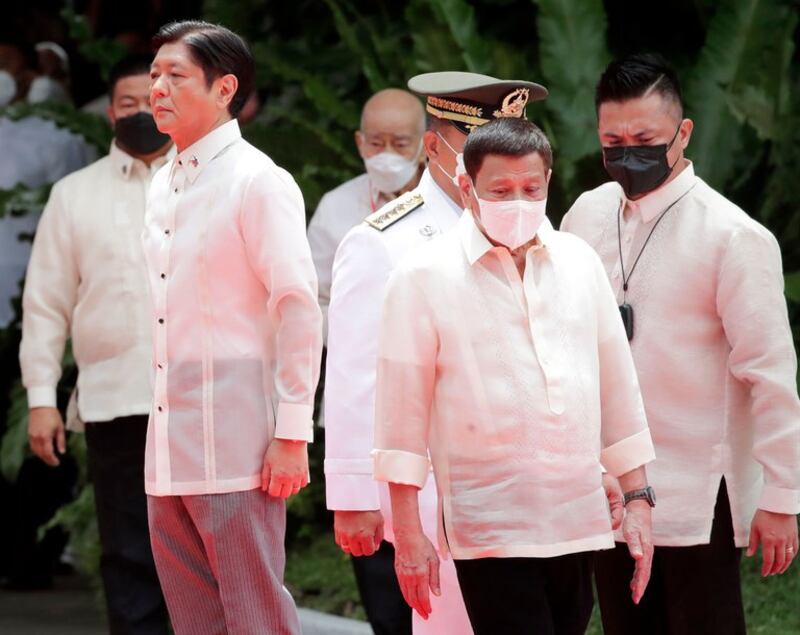Filipino nationalists and activists pressed new President Ferdinand Marcos Jr. to actively assert their country’s territorial rights, as the Philippines marked the sixth anniversary on Tuesday of an arbitration court’s ruling that invalidated Beijing’s sweeping claims in the South China Sea.
About 50 activists assembled outside China’s consulate in Makati, the financial district of the Philippine capital, where they carried signs demanding that Chinese ships and boats stay out of the West Philippine Sea, Manila’s name for its South China Sea territories.
“The issue of the territorial dispute is not just an abstract question of sovereignty, of access to resources,” Benjamin Miguel Alvero, a spokesman for the West Philippine Sea Coalition, the group that led the protest, told BenarNews.
Last month, officials reported that 100 Chinese ships were seen swarming in the Julian Filipe Reef alone – one of the areas inside the Philippines’ exclusive economic zone (EEZ) – but they did not update those figures on Tuesday.
“The militarization of the West Philippine Sea has concrete repercussions for thousands of ordinary Filipinos, of fisherfolk communities that are unable to work and pursue their livelihood because of the threat of harassment, especially from Chinese military forces,” Alvero said.
The Philippines, he said, must confront what he called the “expansionist ambitions of a rising China.”
“We challenge the newly elected administration of Ferdinand Marcos Jr. to prove its commitment to serving the Filipino people (by) pursuing a principled foreign policy, unlike the last six years under the Duterte government,” he said.

Enrique A. Manalo, the new Philippine secretary of foreign affairs, marked the occasion with a statement that did not hold back on the Marcos administration's stance on the landmark 2016 verdict by the Permanent Court of Arbitration in The Hague.
“The findings are no longer within the reach of denial and rebuttal, and are conclusive as they are indisputable,” he said. “The award is final. We firmly reject attempts to undermine it; nay, even erase it from law, history and our collective memories.”
The court’s award on July 12, 2016, along with the United Nations Convention on the Law of the Sea (UNCLOS), are the “twin anchors” of Philippine policy and action in the sea, Manalo said.
The court “authoritatively ruled that the claim of historic rights to resources within the sea areas falling within the ‘nine-dash line’ had no basis in law and is without legal effect,” the foreign secretary added, referring to China’s insistence that it historically owned much of the disputed sea.
Rodrigo Duterte, Marcos’ immediate predecessor who took office in mid-2016, was long criticized for being perceived as soft on China’s military expansionism in the waterway.
Shortly after Duterte came to power, the arbitration court ruled in favor of Manila over Beijing after Chinese ships had refused since 2012 to leave Scarborough Shoal, a South China Sea territory within the Philippines’ 200-mile EEZ. Ever since the court’s decision, Beijing has refused to leave the area and has carried on with its expansionist maritime activities.
During most of his time in office, Duterte engaged Chinese President Xi Jinping in friendlier ties while pulling the Philippines away from China’s traditional rival, the United States. Washington, in the meantime, refused to buckle under pressure and frequently sailed its naval ships into the contested waters under the doctrine of freedom of navigation.
However, late into his term, Duterte declared in a speech to the U.N. General Assembly that the arbitration ruling was "beyond compromise" and that "we firmly reject attempts to undermine it."
BenarNews is an RFA-affiliated online news servic e.
